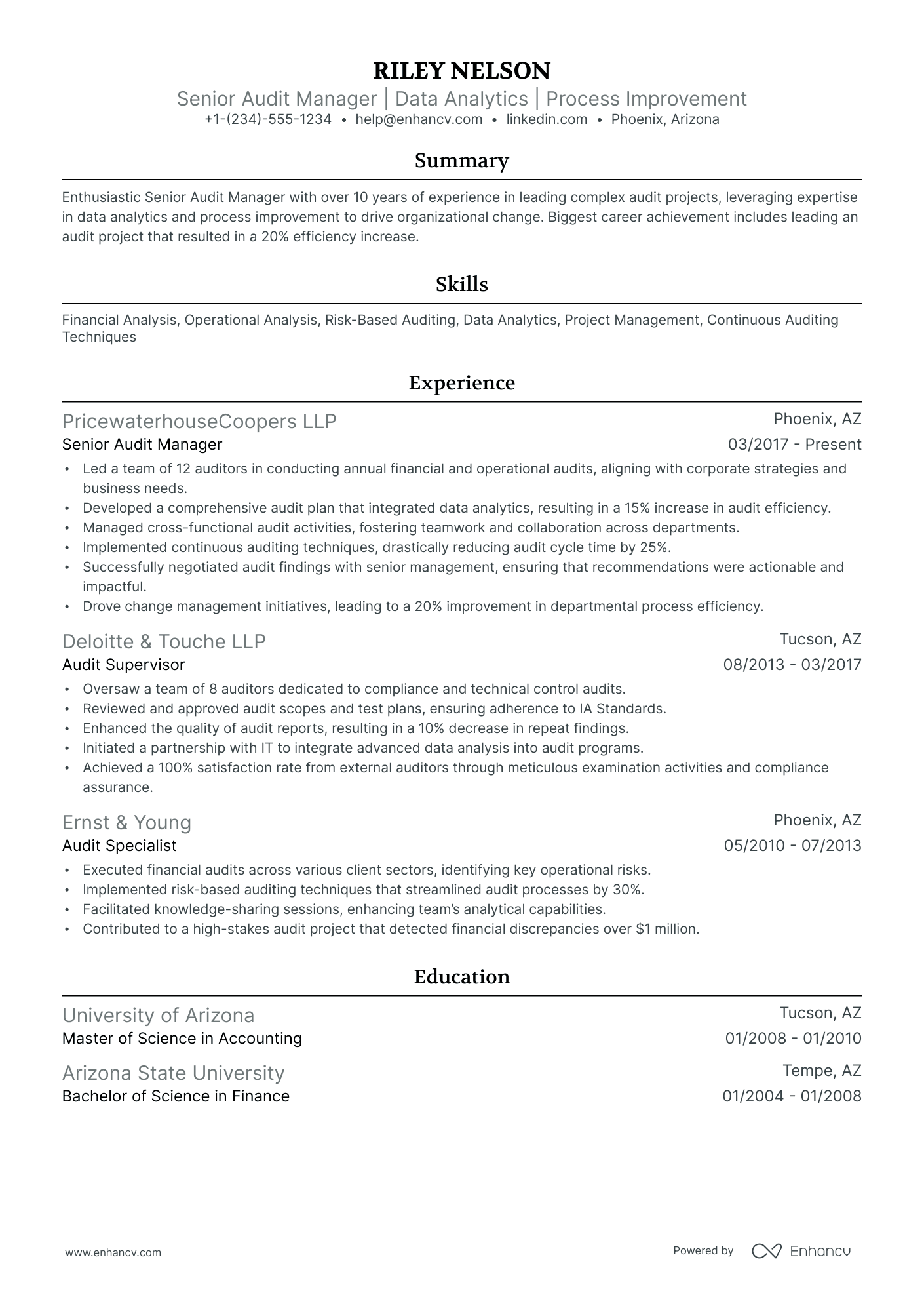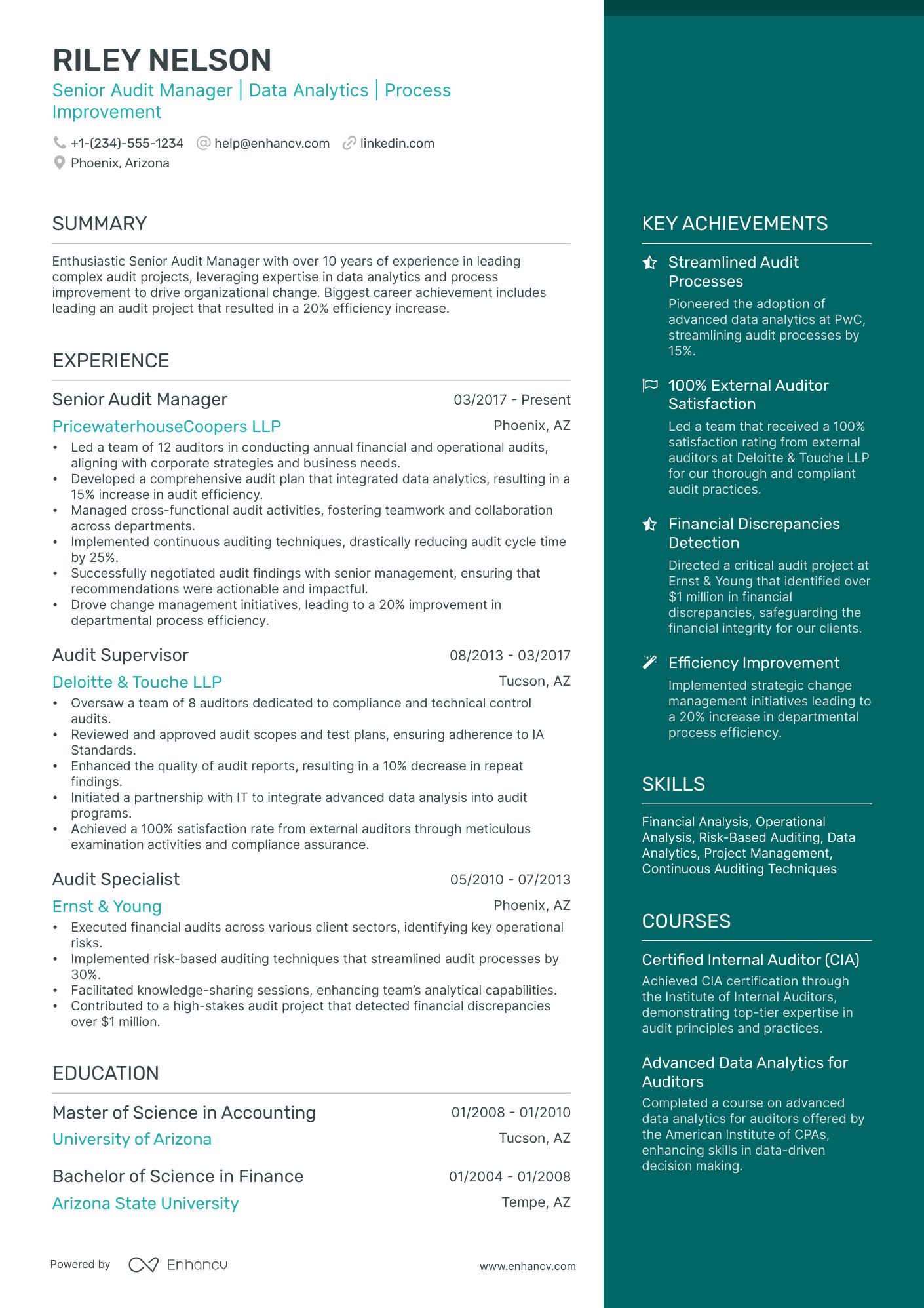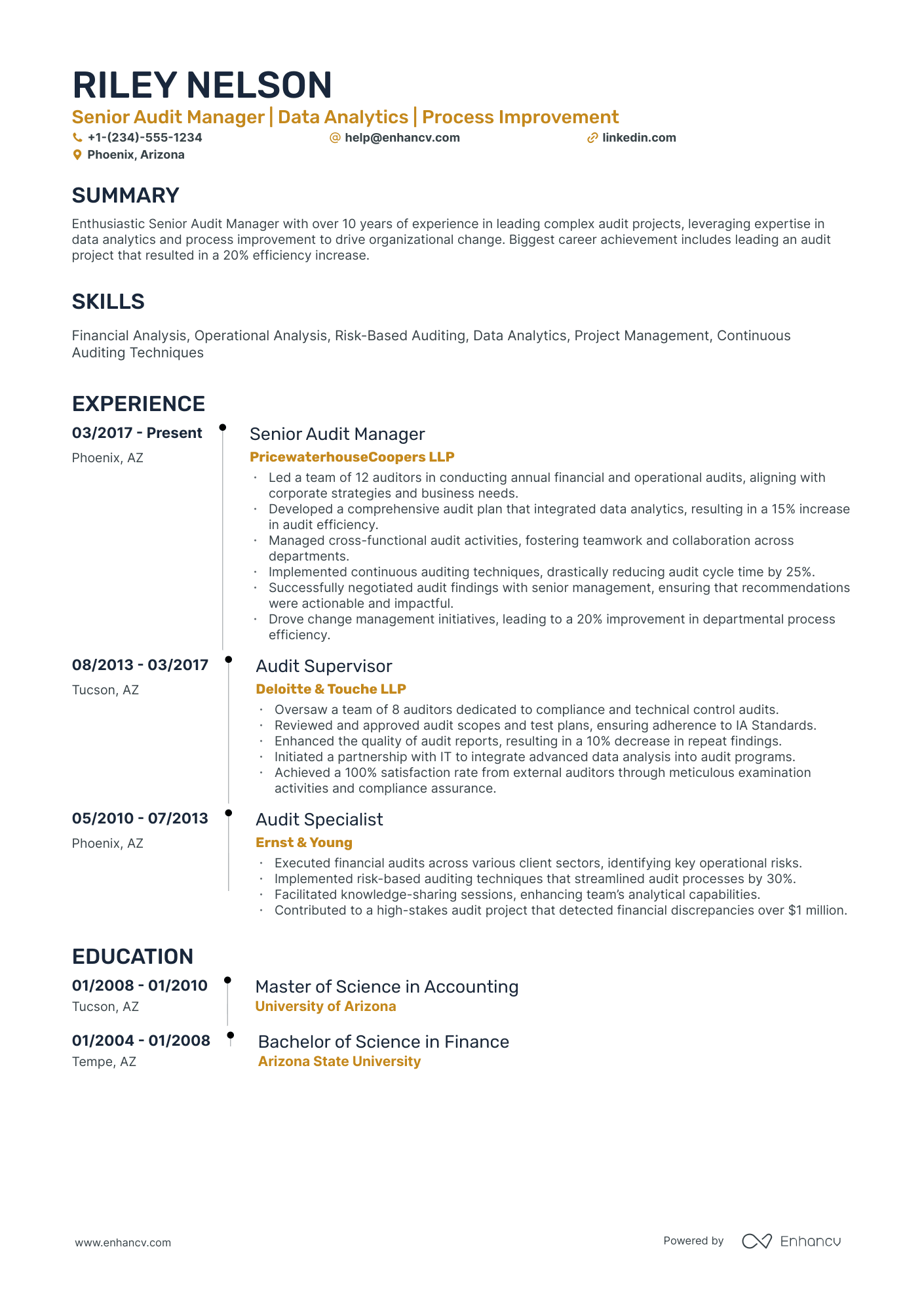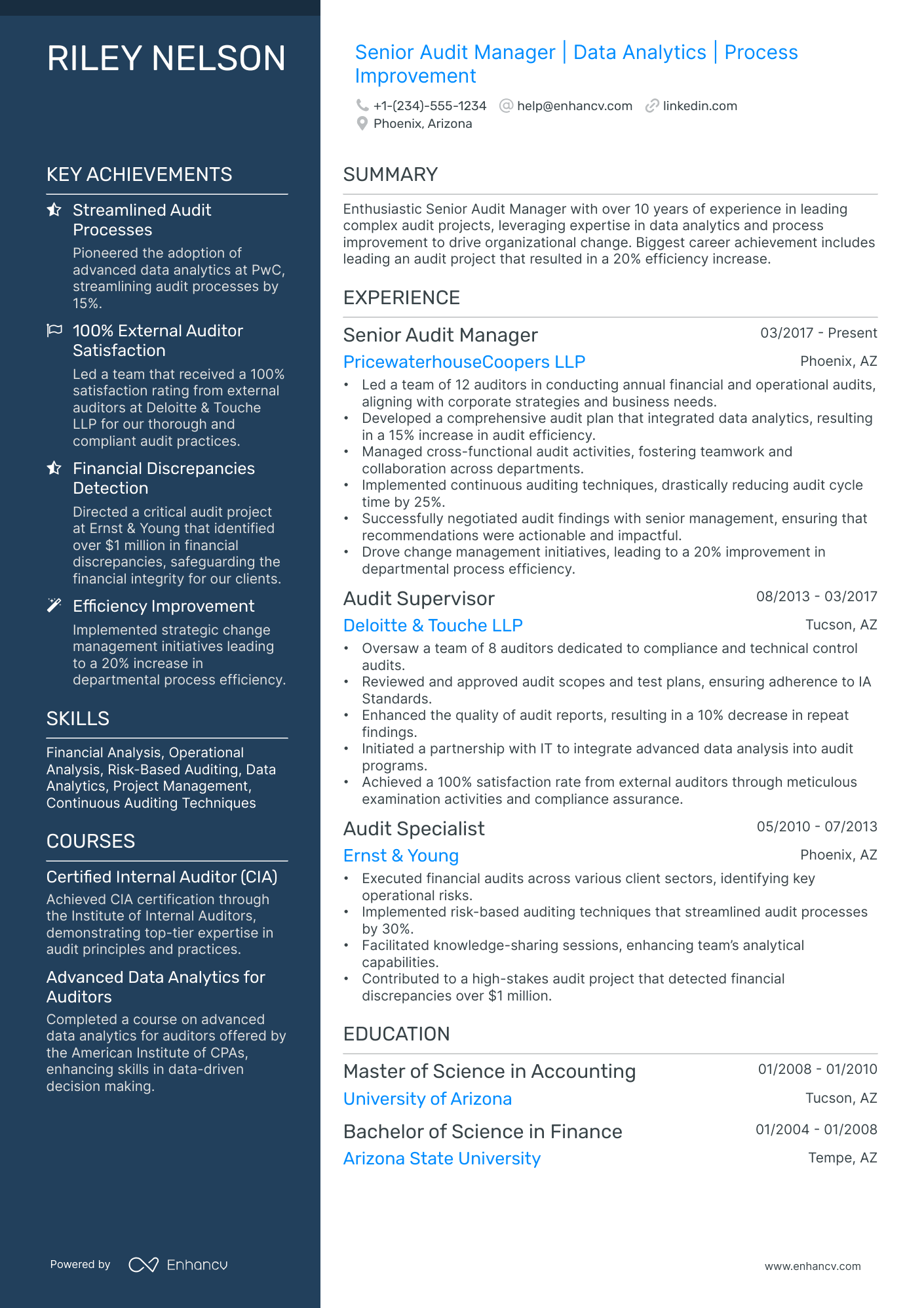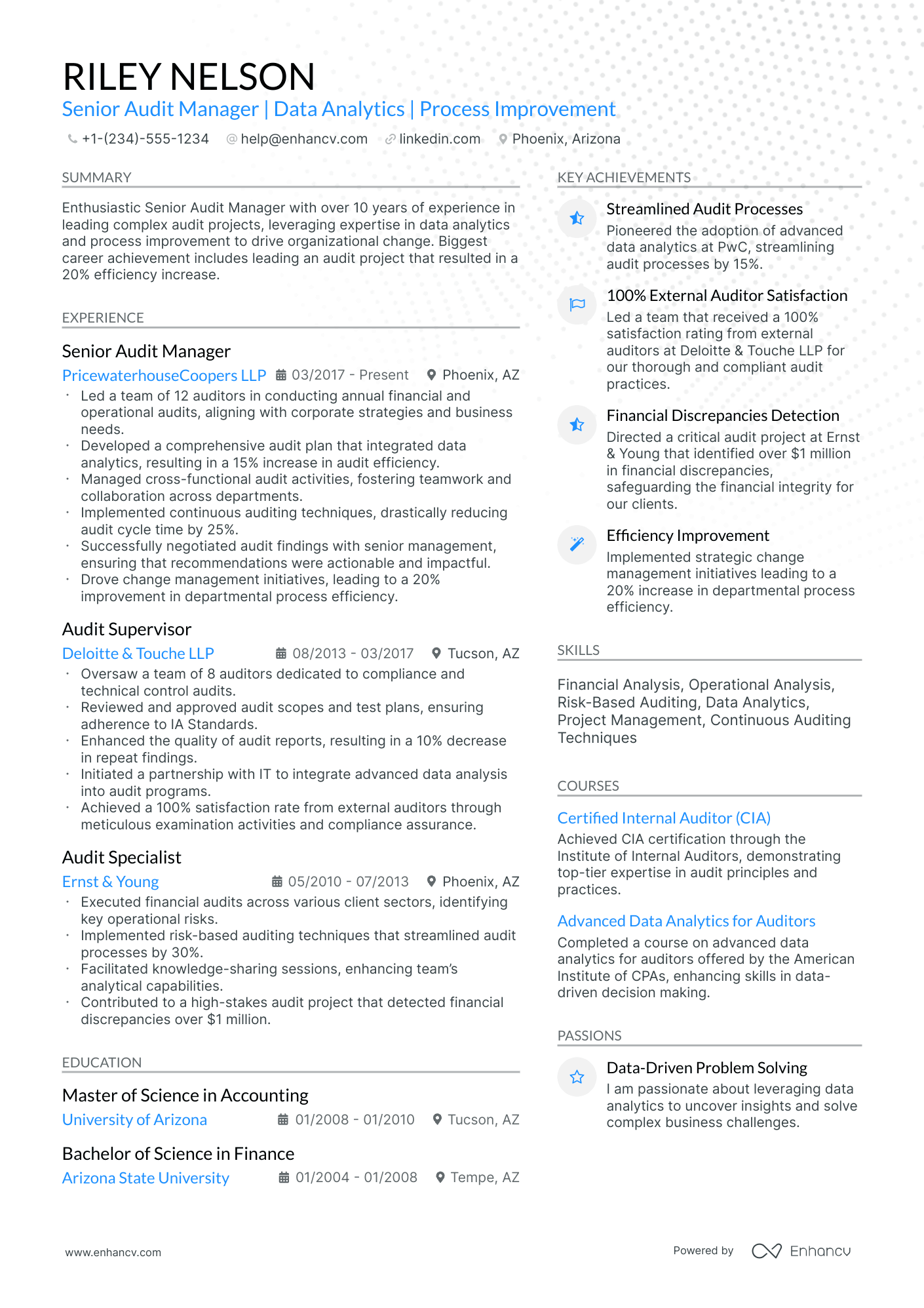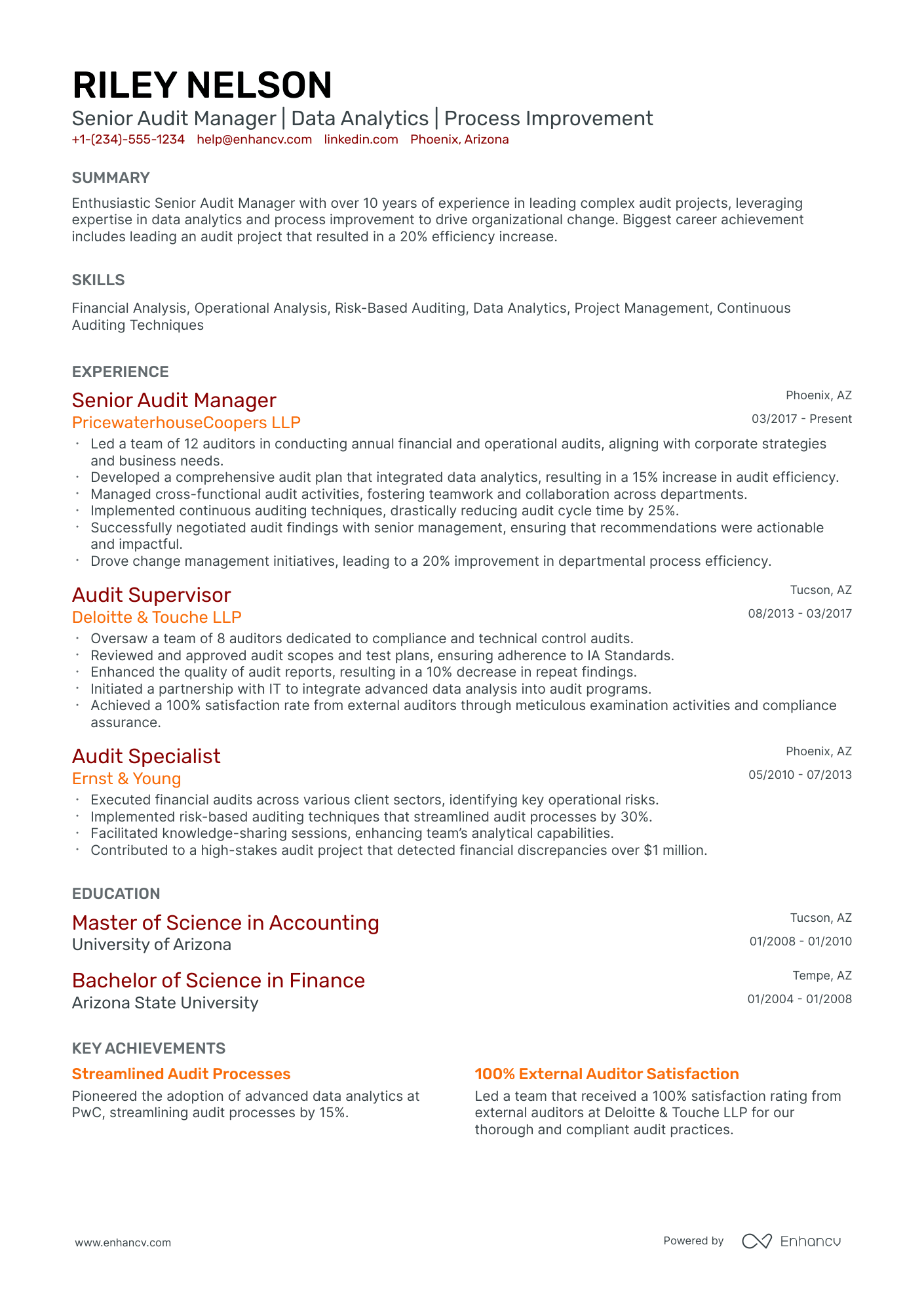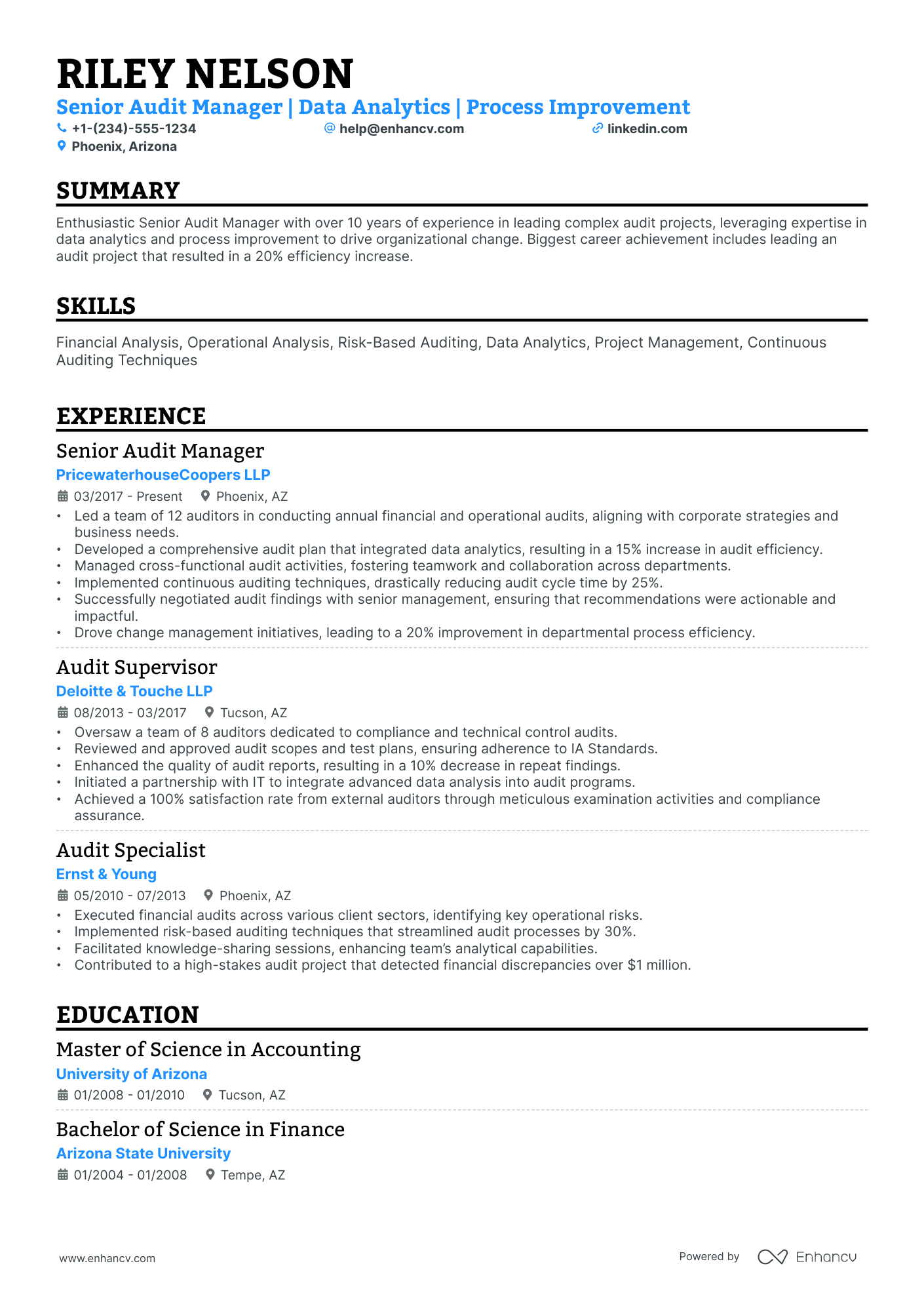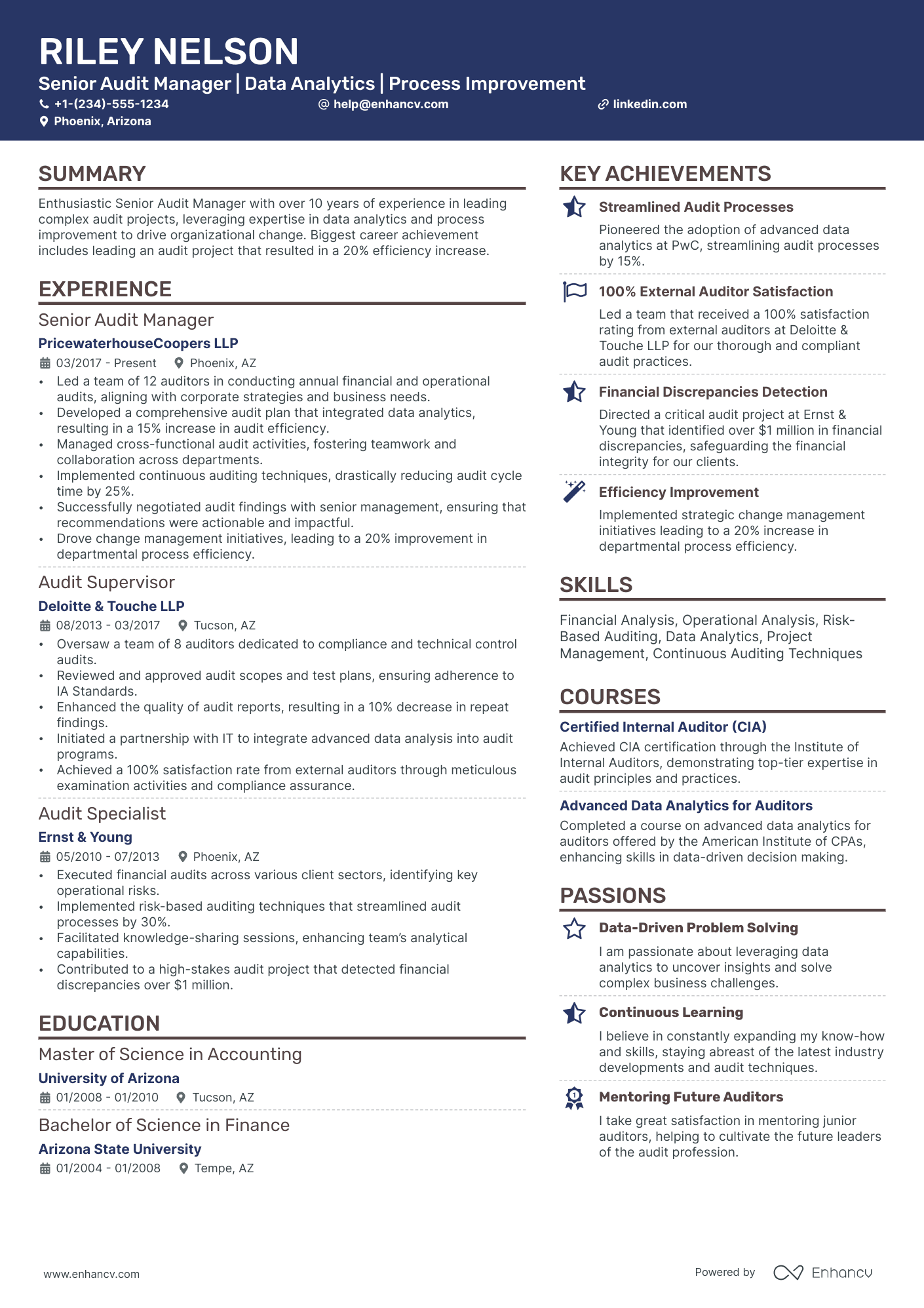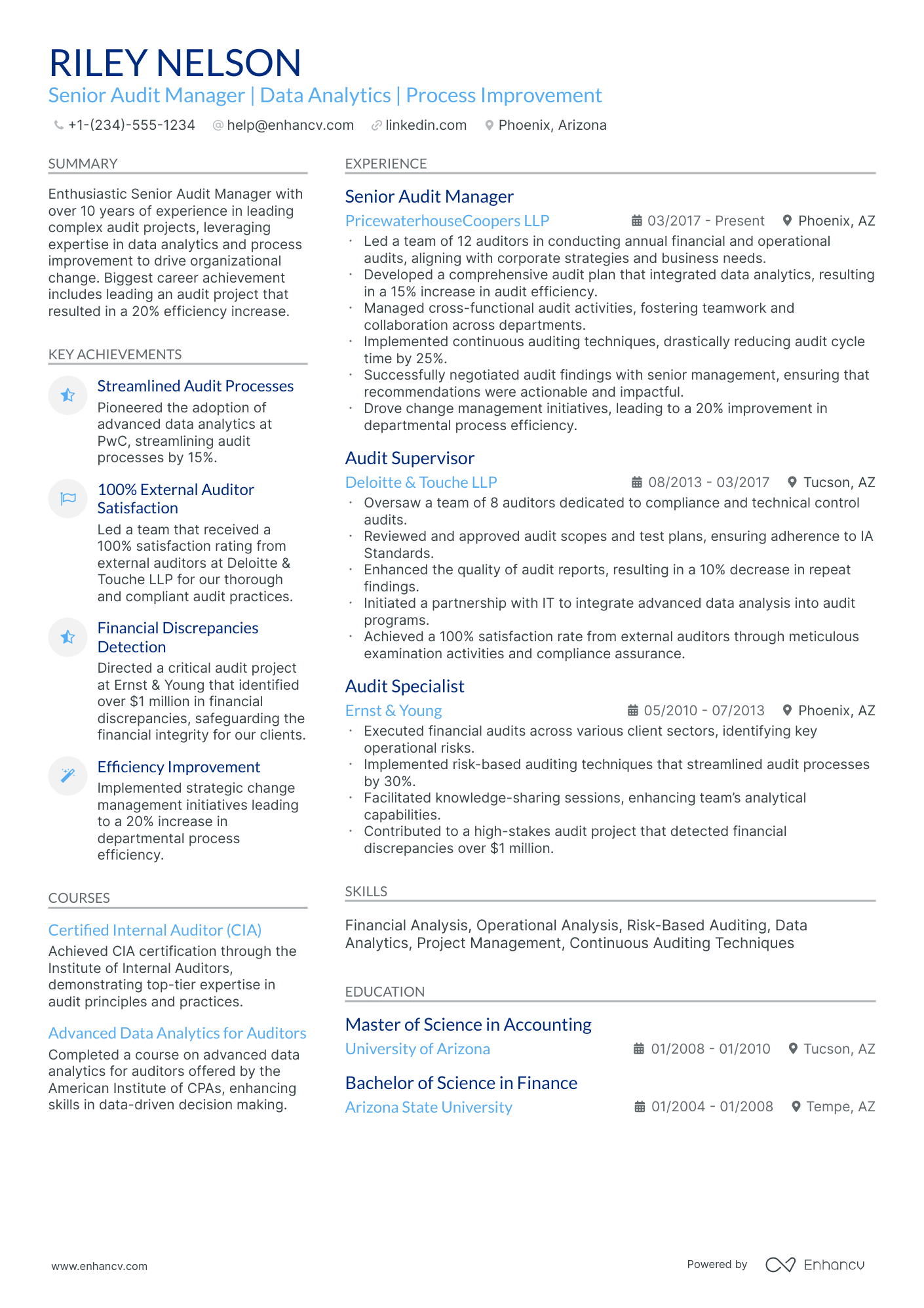Many internal audit manager resume submissions fail because they read like compliance checklists and bury risk-based impact. That hurts when an ATS filters for key competencies and recruiters scan fast in a crowded field.
A strong resume shows what changed because of your work. Knowing how to make your resume stand out means you should highlight reduced control failures, sped up audit cycle time, expanded coverage across entities, improved issue closure rates, influenced management action plans, and protected financial reporting quality.
Key takeaways
- Quantify audit outcomes like cycle time, risk reduction, and cost savings in every experience bullet.
- Use reverse-chronological format to showcase progressive leadership and expanding audit scope.
- Tailor resume language to mirror each job posting's frameworks, tools, and compliance standards.
- Tie every listed skill to a specific, measurable result in your experience or summary section.
- Lead your summary with team oversight and business impact, not task descriptions.
- Place certifications like CIA, CPA, or CISA near education to validate specialized audit expertise.
- Use Enhancv to turn routine audit responsibilities into concise, metrics-driven resume bullets.
How to format a internal audit manager resume
Recruiters evaluating internal audit manager candidates prioritize evidence of progressive leadership in audit functions, ownership of risk frameworks, and measurable improvements to compliance and operational efficiency. A well-chosen resume format ensures these signals—scope of oversight, cross-functional accountability, and business impact—are immediately visible rather than buried.
I have significant experience in this role—which format should I use?
Use a reverse-chronological format to put your leadership trajectory and expanding audit scope front and center. Do:
- Lead each role entry with the scope of your oversight—team size, number of audits managed annually, departments or entities covered, and reporting line (e.g., reporting to VP of risk or audit committee).
- Highlight domain expertise in internal controls, SOX compliance, enterprise risk management, COSO/COBIT frameworks, and audit management tools such as TeamMate, AuditBoard, or Workiva.
- Quantify business impact through audit findings, cost savings, risk reduction, or process improvements tied directly to your recommendations.
Why hybrid and functional resumes don't work for senior roles
Hybrid and functional formats fragment your career timeline and push leadership progression out of focus, making it difficult for recruiters to assess how your audit authority, team oversight, and decision-making responsibility grew across roles. These formats also dilute accountability context—stripping quantified outcomes from the specific positions where you drove them—which weakens the narrative of sustained, senior-level impact. Avoid hybrid and functional formats entirely if you have five or more years of progressive internal audit management experience, as they will obscure the career arc that distinguishes you from less experienced candidates.
- Edge-case exception: A functional resume may be acceptable only if you're transitioning into internal audit management from a closely related discipline (e.g., external audit, risk consulting, or compliance leadership) and have a limited number of directly titled roles—but even then, every listed skill must be tied to a specific project, engagement, or measurable outcome rather than presented in isolation.
Once your layout and formatting choices are in place, the next step is deciding which sections to include so each one reinforces your qualifications as an internal audit manager.
What sections should go on a internal audit manager resume
Recruiters expect to see clear evidence that you lead risk-based audits, strengthen controls, and deliver measurable improvements. Understanding what to put on a resume helps you prioritize the right content. Use this structure for maximum clarity:
- Header
- Summary
- Experience
- Skills
- Projects
- Education
- Certifications
- Optional sections: Awards, Leadership, Languages
Strong experience bullets should emphasize audit scope, risk coverage, control outcomes, stakeholder influence, and quantified results.
Is your resume good enough?
Drop your resume here or choose a file. PDF & DOCX only. Max 2MB file size.
Once you’ve organized your resume with the right components in place, the next step is to write the experience section so it supports each part with clear, role-specific impact.
How to write your internal audit manager resume experience
Your experience section proves you've delivered real audit outcomes—not just performed routine checks. Hiring managers prioritize demonstrated impact through risk mitigation, compliance improvements, and process optimization over descriptive task lists that simply catalog daily responsibilities. Building a targeted resume ensures each bullet speaks directly to the role's priorities.
Each entry should include:
- Job title
- Company and location (or remote)
- Dates of employment (month and year)
Three to five concise bullet points showing what you owned, how you executed, and what outcomes you delivered:
- Ownership scope: the audit functions, compliance programs, risk domains, or teams you were directly accountable for as an internal audit manager.
- Execution approach: the audit frameworks, regulatory standards, data analytics tools, or risk assessment methodologies you applied to plan engagements, evaluate controls, and drive remediation.
- Value improved: the changes you produced in control effectiveness, regulatory compliance posture, operational efficiency, risk exposure reduction, or audit cycle time within your organization.
- Collaboration context: how you partnered with senior leadership, external auditors, legal counsel, regulatory bodies, or business unit stakeholders to align audit priorities and resolve findings.
- Impact delivered: the outcomes your audit work generated—expressed through strengthened governance, reduced financial or operational risk, improved audit ratings, or measurable business protection rather than activity volume.
Experience bullet formula
A internal audit manager experience example
✅ Right example - modern, quantified, specific.
Internal Audit Manager
NorthBridge Financial Services | Charlotte, NC
2021–Present
Regional financial services provider supporting $12B in assets across retail banking, mortgage, and wealth management.
- Led a risk-based audit plan across SOX (Sarbanes-Oxley) and operational audits, increasing coverage of high-risk processes by 30% and reducing repeat findings by 22% year over year.
- Implemented continuous auditing in TeamMate+ and Power BI, automating controls testing for key reconciliations and access reviews and cutting fieldwork cycle time by 18%.
- Directed end-to-end audits of cybersecurity and third-party risk using the National Institute of Standards and Technology Cybersecurity Framework and SOC 1 and SOC 2 reports, closing twelve high-risk gaps and lowering residual risk ratings by 25%.
- Partnered with information technology, finance, and compliance leaders to remediate control deficiencies in SAP and ServiceNow workflows, improving change management compliance from 84% to 96% within two quarters.
- Presented audit results and remediation roadmaps to the audit committee and executive stakeholders, accelerating management action plan closure from seventy-five to forty-five days and improving on-time completion to 93%.
Now that you've seen how a strong experience section comes together, let's look at how to adjust yours to match a specific job posting.
How to tailor your internal audit manager resume experience
Recruiters evaluate your internal audit manager resume through both applicant tracking systems and manual review. Tailoring your resume to the job description ensures your qualifications connect directly with what the hiring team needs.
Ways to tailor your internal audit manager experience:
- Match audit software and tools named in the job description.
- Mirror the exact risk assessment frameworks the posting references.
- Use the same terminology for compliance standards like SOX or IIA.
- Reflect specific KPIs or audit quality metrics the role prioritizes.
- Highlight industry experience relevant to the organization's sector.
- Emphasize internal controls testing methods outlined in the listing.
- Align your leadership scope with the team structure described.
- Reference the regulatory bodies or reporting workflows they mention.
Tailoring means aligning your real accomplishments with each job's stated requirements rather than forcing keywords where they don't belong.
Resume tailoring examples for internal audit manager
| Job description excerpt | Untailored | Tailored |
|---|---|---|
| Lead SOX compliance testing across all business units, partnering with external auditors to ensure timely remediation of control deficiencies. | Helped with compliance activities and worked with auditors on various projects. | Led SOX 404 compliance testing across 12 business units, coordinating with Deloitte's external audit team and driving 95% on-time remediation of 40+ identified control deficiencies. |
| Develop and execute a risk-based annual audit plan using TeamMate+ and data analytics tools such as ACL to identify high-risk areas across financial and operational processes. | Created audit plans and used software to complete audit work. | Built and executed a risk-based annual audit plan in TeamMate+ covering 30+ engagements, leveraging ACL data analytics to pinpoint $2.3M in operational exposure across procurement and revenue cycles. |
| Manage and mentor a team of four internal auditors, providing coaching on audit methodology and ensuring adherence to IIA Standards. | Supervised team members and provided guidance on daily tasks. | Managed and coached a team of four internal auditors on risk assessment methodology and fieldwork execution, achieving full conformance with IIA Standards across two consecutive quality assurance reviews. |
Once your experience section aligns with the role’s priorities, the next step is to quantify your internal audit manager achievements so hiring teams can see the impact of your work.
How to quantify your internal audit manager achievements
Quantifying your achievements proves your audits reduced risk, improved compliance, and sped up issue resolution. Focus on audit cycle time, control effectiveness, remediation closure rates, cost savings, and the scope of systems, locations, and regulations covered.
Quantifying examples for internal audit manager
| Metric | Example |
|---|---|
| Risk reduction | "Reduced high-risk findings by 32% across eight SOX in-scope processes by redesigning key controls and tightening evidence standards in TeamMate+." |
| Audit cycle time | "Cut audit cycle time from nine to six weeks by standardizing walkthrough templates and automating sampling in Excel and Power Query." |
| Remediation closure | "Increased on-time remediation from 68% to 91% by launching a weekly issue triage with owners and tracking actions in ServiceNow GRC." |
| Compliance coverage | "Expanded audit coverage from twelve to eighteen entities, including two acquisitions, while maintaining a one hundred percent completion rate against the annual plan." |
| Cost savings | "Identified $420K in annual savings by flagging duplicate vendor payments and weak approval thresholds, then partnering with accounts payable to implement fixes." |
Turn your everyday tasks into measurable, recruiter-ready resume bullets in seconds with Enhancv's Bullet Point Generator.
With strong bullet points in place, the next step is ensuring your internal audit manager resume highlights the right mix of hard and soft skills.
How to list your hard and soft skills on a internal audit manager resume
Your skills section shows your audit scope and impact, and recruiters and applicant tracking systems (ATS) scan them to confirm fit fast; aim for a balanced mix of technical audit capabilities and role-specific leadership and communication skills.
internal audit manager roles require a blend of:
- Product strategy and discovery skills.
- Data, analytics, and experimentation skills.
- Delivery, execution, and go-to-market discipline.
- Soft skills.
Your skills section should be:
- Scannable (bullet-style grouping).
- Relevant to the job post.
- Backed by proof in experience bullets.
- Updated with current tools.
Place your skills section:
- Above experience if you're junior or switching careers.
- Below experience if you're mid/senior with strong achievements.
Hard skills
Include hard skills that demonstrate your technical audit capabilities:
- Risk-based audit planning
- SOX compliance testing
- COSO internal control framework
- IIA Standards, IPPF
- Operational and financial audits
- ITGC testing, access reviews
- SOC 1 and SOC 2 reports
- Data analytics: SQL, Power BI, Excel
- Audit management tools: TeamMate+, AuditBoard
- ERP controls: SAP, Oracle
- Process mapping, control design
- Issue tracking, remediation validation
Soft skills
Complement your technical abilities with soft skills that reflect leadership and communication:
- Stakeholder management across functions
- Executive-ready audit reporting
- Interviewing and evidence gathering
- Challenging assumptions with tact
- Prioritizing audits by risk and impact
- Driving timely remediation ownership
- Coaching and reviewing audit workpapers
- Leading opening and closing meetings
- Negotiating practical control improvements
- Escalating issues with clear options
- Managing competing deadlines
- Maintaining independence and objectivity
How to show your internal audit manager skills in context
Skills shouldn't live only in a dedicated skills list. Explore resume skills examples to see how top candidates weave competencies throughout their documents.
They should be demonstrated in:
- Your summary (high-level professional identity)
- Your experience (proof through outcomes)
Here's what each looks like in practice.
Summary example
Internal audit manager with 12 years in financial services, leading SOX compliance and ERM programs using TeamMate and ACL Analytics. Reduced audit cycle time by 30% while mentoring a team of six auditors across regional offices.
- Signals senior-level expertise immediately
- Names industry-standard tools
- Quantifies a clear efficiency gain
- Highlights leadership and mentoring
Experience example
Internal Audit Manager
Bridgewell Financial Group | Charlotte, NC
March 2019–Present
- Redesigned the risk assessment framework using ACL Analytics, cutting audit planning time by 25% across four business units.
- Partnered with compliance and legal teams to streamline SOX testing, reducing control deficiencies by 40% year over year.
- Built and led a nine-person audit team, implementing TeamMate workflows that improved report turnaround by three weeks per cycle.
- Every bullet includes measurable proof
- Skills surface naturally through outcomes
Once you’ve tied your internal audit manager strengths to measurable results and real scenarios, the next step is learning how to build an internal audit manager resume with no experience by translating those same capabilities into credible, role-relevant evidence.
How do I write a internal audit manager resume with no experience
Even without full-time experience, you can demonstrate readiness through audit-adjacent projects and training. Our guide on writing a resume without work experience covers strategies that apply directly to entry-level audit candidates. Consider highlighting:
- Internal audit internship rotations
- University audit capstone project
- Sarbanes-Oxley compliance coursework
- Risk and controls case competitions
- Volunteer nonprofit internal controls review
- Data analytics audit dashboard project
- External audit support during busy season
- ISO 27001 internal audit training
Focus on:
- Risk assessment and audit planning
- Controls testing with clear evidence
- Data analytics for exception testing
- Compliance knowledge across frameworks
Resume format tip for entry-level internal audit manager
Use a hybrid resume format to spotlight audit projects, certifications, and tools before work history, so hiring teams see job-ready evidence fast. Do:
- Open with a targeted summary and audit focus.
- Add a "Projects" section with metrics.
- List tools: Excel, SQL, Power BI.
- Map bullets to audit steps and outputs.
- Include coursework tied to controls.
- Built a Power BI audit dashboard from SQL extracts, tested three key controls, and reduced exception review time by 28% in a university audit capstone.
Even without direct experience, your education section can demonstrate the foundational knowledge and credentials that qualify you for an internal audit manager role.
How to list your education on a internal audit manager resume
Your education section helps hiring teams confirm you have the foundational knowledge needed for an internal audit manager role. It validates your academic background quickly.
Include:
- Degree name
- Institution
- Location
- Graduation year
- Relevant coursework (for juniors or entry-level candidates)
- Honors & GPA (if 3.5 or higher)
Avoid listing specific months or days for graduation. Use the year only to keep things clean.
Here's a strong education entry tailored for an internal audit manager resume.
Example education entry
Bachelor of Science in Accounting
University of Illinois at Urbana-Champaign, Champaign, IL
Graduated: 2016
GPA: 3.7/4.0
- Relevant Coursework: Auditing Standards, Internal Controls, Risk Management, Financial Reporting, and Corporate Governance
- Honors: Magna Cum Laude, Beta Alpha Psi Honor Society
How to list your certifications on a internal audit manager resume
Certifications on a resume show an internal audit manager's commitment to learning, proficiency with audit tools and frameworks, and alignment with current industry standards.
Include:
- Certificate name
- Issuing organization
- Year
- Optional: credential ID or URL
- Place certifications below education when they are older, less relevant to internal audit manager work, or secondary to your degree.
- Place certifications above education when they are recent, highly relevant, or required for internal audit manager roles.
Best certifications for your internal audit manager resume
Certified Internal Auditor (CIA) Certified Public Accountant (CPA) Certified Information Systems Auditor (CISA) Certification in Risk Management Assurance (CRMA) Certified Fraud Examiner (CFE) Chartered Financial Analyst (CFA) ISO 27001 Lead Auditor
Once you’ve positioned your credentials to validate your expertise, shift to your internal audit manager resume summary to frame that value in a clear, results-focused snapshot.
How to write your internal audit manager resume summary
Your resume summary is the first thing a recruiter reads, so it must prove your value fast. A strong opening positions you as a leader who drives audit quality and organizational accountability.
Keep it to three to four lines, with:
- Your title and total years of internal audit or risk management experience.
- Domain expertise such as financial services, healthcare, manufacturing, or public sector.
- Core competencies like SOX compliance, risk assessment frameworks, data analytics, or ERP systems.
- One or two measurable achievements, such as audit cycle reductions or cost savings identified.
- Leadership strengths tied to real outcomes, like mentoring teams or influencing executive decisions.
PRO TIP
At the manager level, lead with outcomes and team oversight rather than task execution. Highlight how you've improved audit processes, managed cross-functional teams, or shaped risk strategy. Avoid vague descriptors like "detail-oriented" or "passionate about compliance." Show scope and decision-making authority instead.
Example summary for a internal audit manager
Internal audit manager with eight years of experience leading SOX and operational audits across financial services. Directed a five-person team, cutting audit cycle time by 30% while strengthening enterprise risk coverage.
Optimize your resume summary and objective for ATS
Drop your resume here or choose a file.
PDF & DOCX only. Max 2MB file size.
Now that your summary effectively highlights your audit expertise and leadership value, make sure the header presenting your contact details is equally polished and professional.
What to include in a internal audit manager resume header
A resume header lists your key identifiers and contact details, helping internal audit manager candidates boost visibility, credibility, and pass recruiter screening faster.
Essential resume header elements
- Full name
- Tailored job title and headline
- Location
- Phone number
- Professional email
- GitHub link
- Portfolio link
A LinkedIn link helps recruiters verify experience quickly and supports screening.
Do not include photos on a internal audit manager resume unless the role is explicitly front-facing or appearance-dependent.
Match your header title to the internal audit manager job posting and keep every detail consistent across your resume and online profiles.
Example
Internal audit manager resume header
Jordan Lee
Internal Audit Manager | SOX Compliance, Risk Assessment, and Process Improvement
Chicago, IL
(312) 555-01XX
your.name@enhancv.com
github.com/yourname
yourwebsite.com
linkedin.com/in/yourname
Once your contact details and role-defining information set a clear first impression, add additional sections to reinforce your qualifications and provide supporting context.
Additional sections for internal audit manager resumes
When your core qualifications match other candidates, additional sections help you stand out by showcasing unique strengths relevant to audit leadership. For example, listing language skills on your resume can differentiate you in organizations with global audit operations.
- Languages
- Professional certifications and licenses
- Industry publications and thought leadership
- Professional affiliations and board memberships
- Volunteer and pro bono audit work
- Conference presentations and speaking engagements
Once you've strengthened your resume with relevant additional sections, the next step is pairing it with a well-crafted cover letter to make your application even more competitive.
Do internal audit manager resumes need a cover letter
An internal audit manager resume rarely requires a cover letter, but it often helps in competitive searches. Understanding what a cover letter is and when to use one can make a difference when hiring teams expect clear stakeholder communication or when your resume needs context.
Use a cover letter to add value in these situations:
- Explain role and team fit: Connect your audit approach to the company's risk profile, governance model, and key stakeholders.
- Highlight one or two outcomes: Cite a project that reduced control gaps, improved compliance, or shortened audit cycle time, with clear results.
- Show business context: Reference the company's products, users, and revenue drivers, and link them to your audit plan and reporting priorities.
- Address transitions: Clarify moves from external audit, compliance, or finance, and map your experience to internal audit manager responsibilities.
Drop your resume here or choose a file.
PDF & DOCX only. Max 2MB file size.
Once you’ve decided how to handle the cover letter for your internal audit manager application, the next step is using AI to strengthen your internal audit manager resume so it aligns with the role and reads clearly.
Using AI to improve your internal audit manager resume
AI can sharpen your resume's clarity, structure, and overall impact. It helps tighten language and highlight measurable results. But overuse strips authenticity. Once your content feels clear and role-aligned, step away from AI. If you're exploring tools, learn which AI is best for writing resumes before committing to one.
Here are 10 practical prompts to strengthen specific sections of your internal audit manager resume:
Strengthen summary statement
Quantify experience bullets
Align skills section
Sharpen project descriptions
Improve action verbs
Refine certification details
Tighten education section
Remove filler language
Tailor for ATS
Clarify leadership scope
Conclusion
A strong internal audit manager resume proves impact with measurable outcomes, such as risk reduction, control improvements, and faster audit cycles. It highlights role-specific skills, including audit planning, stakeholder management, and regulatory knowledge. A clear structure makes results and scope easy to scan.
Keep your internal audit manager resume focused, current, and consistent with today’s hiring expectations. Use precise metrics, relevant skills, and clean formatting to show readiness for modern audit programs and evolving compliance needs. This approach helps hiring teams trust your judgment and execution.
